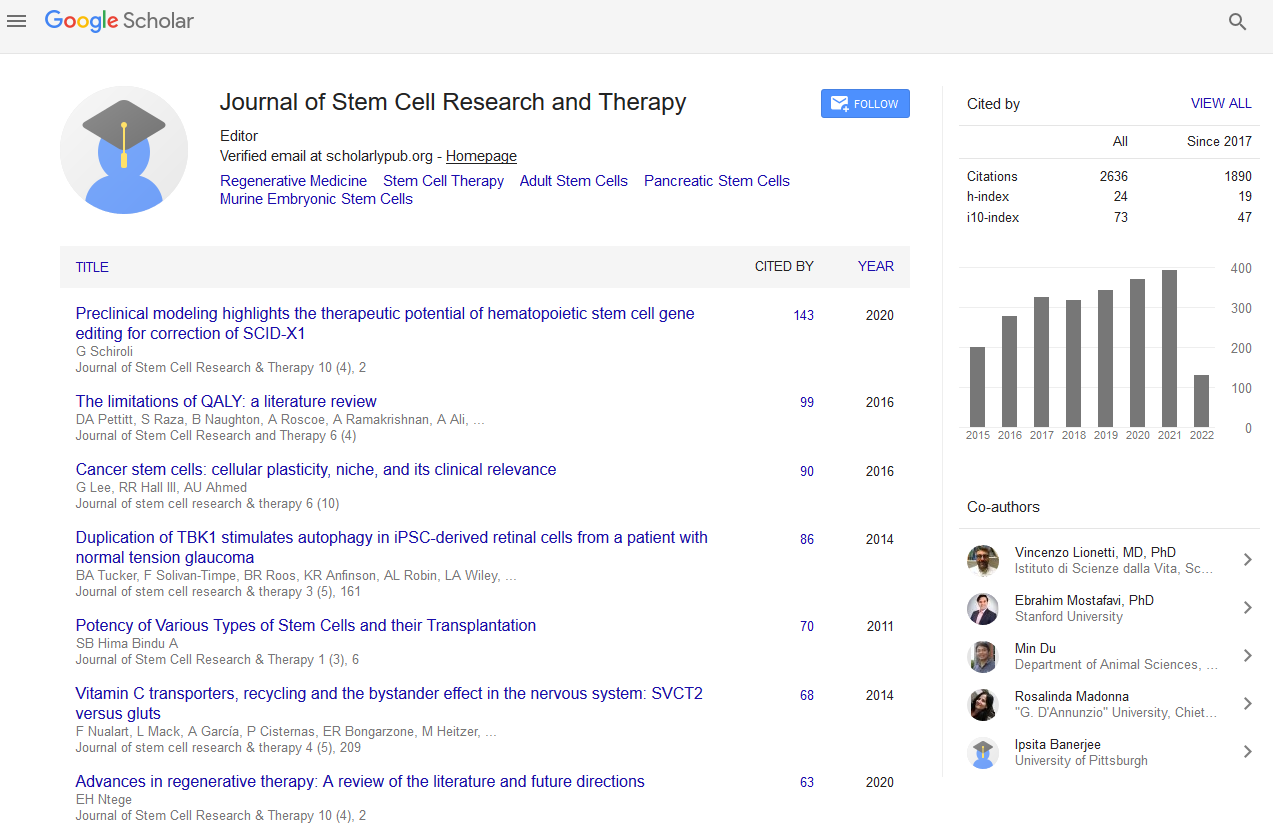Indexed In
- Open J Gate
- Genamics JournalSeek
- Academic Keys
- JournalTOCs
- China National Knowledge Infrastructure (CNKI)
- Ulrich's Periodicals Directory
- RefSeek
- Hamdard University
- EBSCO A-Z
- Directory of Abstract Indexing for Journals
- OCLC- WorldCat
- Publons
- Geneva Foundation for Medical Education and Research
- Euro Pub
- Google Scholar
Useful Links
Share This Page
Journal Flyer

Open Access Journals
- Agri and Aquaculture
- Biochemistry
- Bioinformatics & Systems Biology
- Business & Management
- Chemistry
- Clinical Sciences
- Engineering
- Food & Nutrition
- General Science
- Genetics & Molecular Biology
- Immunology & Microbiology
- Medical Sciences
- Neuroscience & Psychology
- Nursing & Health Care
- Pharmaceutical Sciences
Very Small Embryonic Like stem cells (VSELs) ? As rosetta stone to understand regeneration, longevity and cancer
International Conference on Regenerative & Functional Medicine
November 12-14, 2012 Hilton San Antonio Airport, USA
Mariusz Z. Ratajczak
Keynote: J Stem Cell Res Ther
Abstract:
Pluripotent very small embryonic/epiblast derived stem cells (VSELs) as we hypothesize are deposited at begin of gastrulation in developing tissues and play an important role as backup population of pluripotent stem cells (PSCs) for tissue committed stem cells (TCSCs). Molecular analysis of adult bone marrow (BM)-derived purified VSELs revealed that they i) express pluripotent stem cells markers e.g., Oct4, Nanog, Klf-4, SSEA-1 ii) share several markers characteristic for epiblast as well as migratory primordial germ cells (PGCs), and iii) posses a unique pattern of genomic imprinting (e.g., erasure of differently methylated regions at Igf2-H19 and Rasgrf1 loci and hypermethylation at KCNQ1 and Igf2R loci). We hypothesize that these pluripotent stem cells play an important role in tissue/organ rejuvenation, and their proliferation and potentially premature depletion is negatively controlled by epigenetic changes of imprinted genes that regulate insulin factor signaling (Igf2-H19 locus, Igf2R and RasGRF1). Since the attenuation of insulin/insulin growth factor (Ins/Igf) signaling positively correlates with longevity, we propose, based on our experimental data in animal models, that gradual decrease in the number of VSELs deposited in adult tissues, which occurs throughout life in an Ins/Igf signaling- dependent manner is an important mechanism of aging. In contrast, a decrease in Ins/Igf stimulation of VSELs as seen for example during calorie restriction extends the half life of these cells in adult organs and has a beneficial effect on life span. On other hand the same epigenetic changes in the epigenetic signature of imprinted genes keep these cells quiescent in adult tissues and prevent them from teratoma formation. In contrast epigenetic changes/mutations that lead to activation of imprinted genes could potentially lead to tumor formation by these cells. Mounting evidence accumulates that perturbation of expression of imprinted genes is a common phenomenon observed in developing tumors. We envision that mutated VSELs are origin of several malignancies including teratomas, germinal tumors and pediatric sarcomas.
Biography :
Mariusz Z. Ratajczak is a Director of Stem Cell Institute at James Graham Brown Cancer Center, Professor of Medicine for the of Department of Medicine, Professor of Immunology for the Department of Microbiology, University of Louisville, Louisville, Ky. Henry and Stella Hoenig Endowed Chair in Cancer Biology. Foreign member of Polish Academy of Art and Science. He has received his MD from Pomeranian Medical University, Poland (1975-1981) and PhD in Experimental Hematology from Polish Academy of Sciences, Warsaw (1886). He received the 2008 President?s Award for Outstanding Scholarship, Research and Creativity from the University of Louisville, the 2007 Mosaic Award from Jewish Family and Vocational Service, the 2006 Award.


